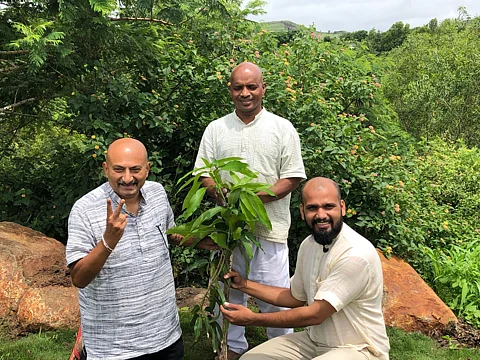

“Peace activists from both nations have embarked on a botanical venture, marrying the distinct mango varieties of their lands: Pakistan’s Chausa with India’s Kesar”
Iftikhar Gilani
In an era marked by severed diplomatic ties and silenced dialogues between India and Pakistan, a unique initiative rooted in the shared love for mangoes – the national fruit of both countries – aims to weave a narrative of peace and camaraderie.
Peace activists from both nations have embarked on a botanical venture, marrying the distinct mango varieties of their lands: Pakistan’s Chausa with India’s Kesar. This cross-border collaboration will soon give birth to a promising new variety. Though variety till now remains unnamed, the activists aptly call it “Dosti,” embodying the essence of friendship and unity.
The journey of “Dosti” began in the serene town of Garade, near Pune, Maharashtra, where peace activists, inspired by their travels to Pakistan, undertook the challenge of grafting these two mango varieties. Their efforts anticipate a mango that combines the Pakistani Chausa‘s aromatic sweetness with Kesar’s distinctive flavour, a symbol of these nations’ rich, intertwined cultures.
Mangoes, beyond their succulence, hold a profound place in the art, poetry, and diplomatic gestures of India and Pakistan. Pakistan’s tradition of gifting its finest mangoes to global dignitaries, dating back to the 1960s, highlights the fruit’s role as an ambassador of goodwill. Producing approximately 1.7 million tonnes annually, Pakistan ranks as the world’s sixth-largest mango exporter. The Chausa variety, originating from Rahim Yar Khan and Multan, is celebrated for its golden-yellow hue, minimal fibre, and high vitamin C content, making it a global favourite.
Conversely, India’s Kesar mangoes, boasting a saffron colour reminiscent of their name, thrive beyond the Girnar Hills of Junagadh, Gujarat, finding a home across Maharashtra. This medium-sized, oval-shaped fruit, with its golden yellow flesh marked by a touch of red, stands as India’s second most beloved mango. India ranks first among the world’s mango-producing countries accounting for 12 million tonnes about 50% of the world’s mango production.
The story of “Dosti” unfolds at Peace Hill Garden, a botanical haven situated on Pune’s outskirts. This garden, born from the generosity of Yunusbhai Shipchandler, who donated land during the pandemic, has become a sanctuary for peace under the stewardship of Yogesh, a software engineer turned peace activist.
After facing personal tragedy and leaving a prosperous career in the IT sector, Yogesh, who now goes by VishwaMitra, meaning friend of the universe, dedicated his life to promoting peace and well-being.
Mosaic cultural diversity
Peace Hill Garden has evolved into a mosaic of cultural and botanical diversity, hosting statues of peace luminaries and serving as the grounds for the remarkable mango grafting experiment. The garden stands as a testament to the possibility of unity amidst diversity, inviting thousands to its tranquil embrace.
The grafting of the Chausa and Kesar varieties, conducted in a poignant ceremony attended by mentors and peace activists alike, marks a step towards realizing the vision of “Dosti.”
This initiative not only showcases the potential for agricultural innovation but also symbolizes the deeper aspirations for peace and unity across borders. The activists’ journey, fraught with challenges, including navigating the strict regulations against tree export, underscores their commitment to their cause. Their eventual success in bringing the Pakistani Chausa sapling to Indian soil epitomizes the spirit of cooperation and mutual respect.
The idea was seeded when peace activists Nitin Sonawane, Jalandharnath Channole and Yogesh VishwaMitra were gifted a mango sapling by a Pakistani farmer Irshad in Lahore. But as they were crossing back to India from the Wagah-Attari border, the Pakistan immigration authorities initially disallowed them from taking the tree to India.
Sonawane tried to woo the officials by telling them that it was a token of love and peace from brothers on the Pakistan side. The officials were unmoved. Then a pair of eyes fell on the flute Channole always carries. One of the Pakistani officials was also a flutist.
Channole was told to play the flute. The tense atmosphere soon melted into one of amity and belonging. The officials agreed to let the tree through, reminding the trio that the Indian immigration officials at the Wagah border would probably confiscate it.
On the Indian side, Channole played the song Vaishnav Jan Te, one of Gandhi’s favourite bhajans or hymns, and the trio also sang their signature Jai Jagat (victory of the world) song, which the officials appreciated whole-heartedly and let them carry the sapling.
As “Dosti” in a few years will bear its first fruits, the activists dream of sharing its bounty with friends and leaders in Pakistan, thereby cementing their message of peace. This initiative extends beyond the realms of horticulture, aspiring to graft the seeds of unity in Bangladesh and beyond, thereby crafting a living testament to the enduring power of peace and cooperation.
Activists say, this endeavour is not just about creating a new mango variety; it’s a narrative of resilience, hope, and the unyielding belief in the power of unity.
As the world watches, “Dosti” emerges as a symbol of the possibilities that blossom when people choose peace over conflict, dialogue over silence, and friendship over enmity. Through the simple act of grafting mango trees, a profound message of harmony and coexistence is sent across borders, offering a taste of what can be achieved when hearts and minds are open to the fruits of peace.
—–
Have you liked the news article?